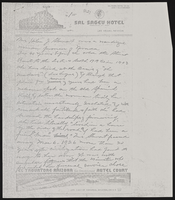Search the Special Collections and Archives Portal
Search Results

Stewart family histories
Date
Archival Collection
Description
Stewart family histories
Text
Evelyn Garcia-Morales (Clark County School Trustee) oral history interview conducted by Magdalena Martinez: transcript
Date
Archival Collection
Description
From the Lincy Institute "Perspectives from the COVID-19 Pandemic" Oral History Project (MS-01178) -- Elected official interviews file.
Text

Roadrunners Internationale Banquet presentations, October 6, 2005
Date
Archival Collection
Description
Text

Talia Levanon oral history interview: transcript
Date
Archival Collection
Description
Oral history interview with Talia Levanon conducted by Barbara Tabach on January 21, 2019 for the Remembering 1 October Oral History Project. In this interview, Levanon discusses her role as the Director of Israel Trauma Coalition (ITC), an organization that provides trauma care and counseling in Israel and around the world. She recalls that three weeks after the 1 October shooting, she and a team from ITC arrived in Las Vegas, Nevada to offer training and support and worked closely with Las Vegas Metro Police Department.
Text

Transcript of interview with George Pollak by Claytee White, May 25, 2010
Date
Archival Collection
Description
George was raised in Mattapan, a suburb of Boston, by his mother and father. George had four siblings and was the second youngest. George shares fond memories of growing up and playing softball and tennis in the neighborhood park with his numerous friends. George could listen to a song on the radio and play it on the piano by ear when he was as young as four years old. George had several jobs to earn money growing up, including working in a record store and as a busboy. Eventually George and his brother joined a trio with Steve Harrington and performed in clubs. In 1958, George joined his brother and Paulette Richards in Las Vegas where they had a contract to play at El Rancho Hotel & Casino where they played until it was destroyed by fire. Following the fire, George and his brother parted ways and each did their own thing. In the 1960s, George began playing with the band at Caesars Palace. George used his background in accounting to do some bookkeeping and payroll for some of the ban
Text

Transcript of interview with Dayvid Figler by Barbara Tabach, June 22, 2016
Date
Archival Collection
Description
Dayvid Figler (1967 - ) is the quiet boy who became an insightful and creative contributor to the local culture of Las Vegas. The oldest of Barbara and Meyer Figler?s three children, he was four years old when the family station wagon reached Las Vegas in 1971. They moved in with Uncle Izzy (aka Big Irish) Figler for a few months. Having the ?juice,? Dayvid?s father soon became a Pan dealer on the Strip. As the family grew, Barbara eventually immersed her energies in her children?s activities, Hadassah and Temple Beth Sholom. In this oral history, Dayvid also recalls his awkward, but incredibly interesting youth, his bar mitzvah at Temple Beth Sholom, and path to a successful career as a criminal defense attorney. He also talks about embracing Las Vegas as his home, owning a home in John S. Park neighborhood and mentions a number of literary depictions of Las Vegas that he admires. Dayvid describes growing up a ?casino kid? who lived in an apartment near the Riviera Hotel. This, in addition to his slight stature and academic brilliance, may have set him apart from many of his childhood peers. He graduated from Valley High School at the age of 16 and by the age of 23 he was a rising star in the legal world. He looks back with appreciation to his list of mentors who encouraged him along the way. Dayvid is also a local favorite as an essayist and poet. For a number of years he could be heard on KNPR/NPR. He has been a performer in hundreds of productions that featured his comic wit and writings, from Lollapalooza to Tom and Jerry?s on Maryland Parkway.
Text

Transcript of interview with Renee Diamond by Barbara Tabach, November 20, 2014
Date
Archival Collection
Description
In this interview, Renee Diamond discusses coming to Las Vegas via Los Angeles, with her husband and children in the 1970s and getting involved in politics. She talks about her husband, Leo, and his business selling vinyl records in L.A., and her work in a doctor's office. Once in Las Vegas, the Diamonds joined Temple Beth Sholom and later Congregation Ner Tamid. Renee talks about her involvement in the political arena in southern Nevada, including the League of Women Voters.
Community activism and social justice rank high in the legacy of Renee Diamond. She often refers to herself as one of the last of the generation without college degrees that could make a difference in the politics of the state. When Renee, her husband Leo Diamond moved their family to Las Vegas from southern California, the energetic advocate Renee quickly plugged into the community. The word "No" was not part of her vocabulary. Among the many Jewish and secular activities the she engaged in were: the editorial board of the Jewish Reporter newspaper; Hadassah; Anti-Defamation League; Red Cross Board; State Museum Board to name a few. She remains a vibrant Democratic Party leader and served one term on the Nevada Assembly in 1989. She was on the front lines as a fierce and active supporter of Welfare Rights, Fair Housing and the Equal Rights Amendment. It is a life that included working alongside illustrious women and men of Southern Nevada history. A list that includes: Harriet Trudell, Ruby Duncan, Myrna Williams and Dorothy Eisenberg and many more mentioned here. Meanwhile she raised four children and enjoyed a loving 43-year marriage with Leo (aka "Uncle Leo") whose career included the popular Bingo Palace, Slots-A-Fun and Stations Casinos. During this oral history interview she recalls the Las Vegas that she moved to in 1972 and reflects on what attracted people here, ways to be part of the Jewish life which might even include a bowling league and how involvement in raising social awareness was a worthy investment of ones' time. This is a look at a woman who made a difference.
Text

Interview with Leslie Ray Hill, February 17, 2006
Date
Archival Collection
Description
Text

Astrid Silva oral history interview: transcript
Date
Archival Collection
Description
Oral history interview with Astrid Silva conducted by Monserrath Hernández and Barbara Tabach on April 22, 2019 for the Latinx Voices of Southern Nevada Oral History Project. Astrid Silva was born in Gomez Palacio, Durango in 1988. She immigrated with her mother to the United States in 1992, where they were met by her father before flying to Los Angeles. She recounts her first impression of the United States and her families eventual move to Las Vegas, where she describes her time living in Las Vegas' west side and struggles she faced being an undocumented student living in Las Vegas. She describes her first meeting with Senator Harry Reid and the friendship that developed afterwards. She has spoken at the Democratic National Convention and has been vocal about her status as a Dreamer. She is currently the Executive Director for DREAM Big Nevada which was established in 2017 in order to provide aid to Nevada's immigrant families. She writes about her hopes for Dreamers and her continued work in expanding the ways that immigrant families can be helped in an always changing political climate. Subjects discussed include: DACA, Dreamers, Immigrant Rights, and Higher Education.
Text

